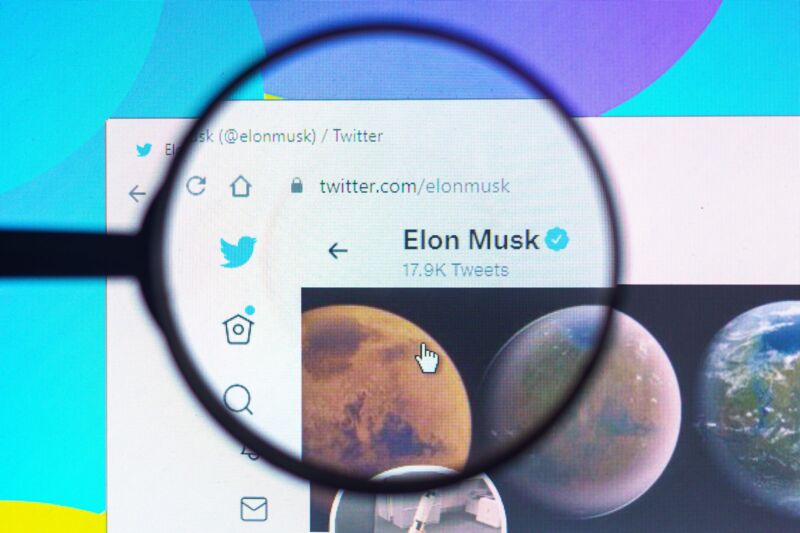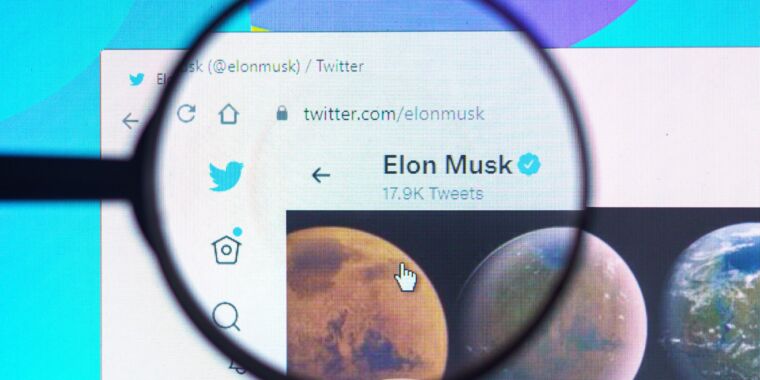
Getty Images | SOPA images
Elon Musk is expected to take “drastic steps” to get under his $44 billion deal to buy Twitter, The Washington Post wrote yesterday in an article citing “three people familiar with the matter.” .
The anonymous sources seem to come from Musk’s camp. Musk’s team has concluded that it cannot verify Twitter’s numbers on spam accounts, and Musk’s “doubts about the spam numbers indicate they don’t have enough information to assess Twitter’s prospects as a business.” to evaluate,” the Post wrote. Musk’s people have also reportedly “stopped having certain discussions about financing for the $44 billion deal, including with a party cited as a likely lender.”
According to the Post, one of the sources said Musk’s team is now “expected to take potentially drastic measures.” would be.”
None of the comments are far from what Musk himself has said publicly since he tried to get out of the Twitter deal. Although his offer to buy Twitter waived “business due diligence,” he later threatened to cancel the contract, alleging that Twitter violated the merger agreement by refusing to provide the data behind its spam estimates. Twitter then gave Musk access to his “fire hose” data.
Twitter “believes deal contract is on its side”
Despite Musk expressing his reservations as solely about Twitter’s spam estimates, Tesla’s CEO is likely wary of completing the purchase as the value of both Twitter and Tesla stock has fallen since he closed the Twitter deal on April 25. . don’t give Musk an easy way out. There is a $1 billion severance package, but Musk can’t necessarily get away that cheaply, and his responsibility could ultimately be decided in court.
As we have written, the merger agreement says that if Twitter fulfills its obligations under the agreement, it will be “entitled to specific performance or other equitable remedy” to “make the stock investor [Musk] to fund the equity financing, or to enforce the equity investor’s obligation to fund the equity financing directly, and to complete the closing.
To try and get out of the deal, Musk could “send a letter to Twitter saying he’s ending the deal, and he could sue Twitter,” The New York Times noted today. But there are “no apparent reasons for Mr. Musk to try to break the deal,” and Twitter could counter. The company “strongly believes that the deal contract is on his side, and that it would be an uphill battle for Mr. Musk,” the Times wrote.
The existence of spam accounts on Twitter was already known before Musk agreed to buy the company. In announcing the deal, Musk said one of his main goals in buying Twitter was to “beat the spam bots.” Musk spoke to Twitter employees in a virtual town hall on June 16, but did not provide a clear update during the meeting as to whether he would finalize the deal.
Fire hose apparently won’t help Musk refute spam estimate
Musk has provided no evidence to refute Twitter’s specific claim about spam accounts, which is that less than 5 percent of daily active monetization users (mDAUs) are spam or fake. The fire hose gives Musk access to all tweets on the platform, but that doesn’t necessarily show whether tweets were posted by humans or bots or how many people view Twitter posts each day without posting themselves.
Twitter defended its spam estimates in a briefing with reporters yesterday. “The company says it points human content reviewers to a specific sample of tweets and relies on a variety of signals, both public and private, to evaluate the activity of the accounts,” Axios wrote after the briefing. “It says that no outsider, even those who have access to the full stream of tweets, can replicate the process.”
The Wall Street Journal’s report of the briefing said that “Twitter officials declined to say whether the company shared the personal user information with Mr. Musk. They would only say that Twitter has fully complied with the obligations of the purchase agreement and that the privacy of user information was important to the company.”
Twitter released a statement early last month saying that it “in conjunction with Mr. Musk has and will continue to share information to complete the transaction in accordance with the terms of the merger agreement. We believe that this agreement is interest of all shareholders. We intend to complete the transaction and enforce the merger agreement at the agreed price and terms.”
When Ars reached out to him today, Twitter said it has no further comment than his statement from a month ago. Twitter also told staff last month that a shareholder vote on the Musk deal should take place in late July or early August.

